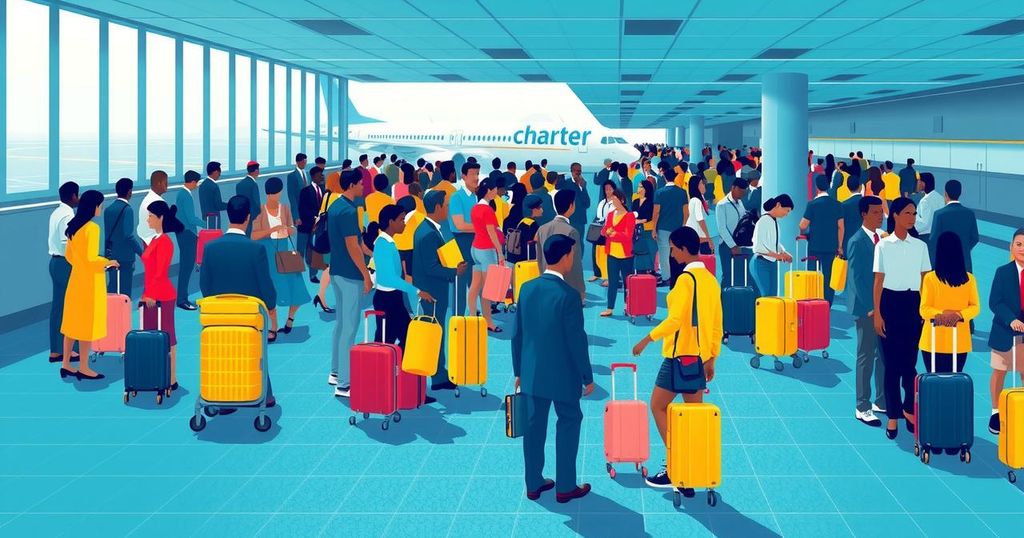Cars
AFRICA, ASIA, COLLEN MSIBI, CURRENT_AFFAIRS, DONALD TRUMP, DULLES, DULLES AIRPORT, EL, IMMIGRATION, JAPAN, JOHANNESBURG, LEADERSHIP, LEGAL CHALLENGES, MS, NORTH AMERICA, NPR, REUTERS, SOUTH AFRICA, SOUTH AFRICAN TRANSPORT MINISTRY, TESLA, TEXAS, TRANSPORT MINISTRY, TRUMP, UNITED STATES, US, US STATE DEPARTMENT, USA, WASHINGTON
Ethan Kim
0 Comments
Afrikaner Refugees Depart South Africa for the U.S. Under Trump Administration Program
The first group of Afrikaner refugees left South Africa for the U.S. under a Trump administration program, igniting debates over race and privilege. Concerns about alleged persecution and land expropriation in South Africa fuel this migration, raising questions about the realities faced by white South Africans since apartheid.
In a notable development, the first group of white South Africans under the Trump administration’s refugee program boarded a charter plane in Johannesburg on Sunday. According to a report by Reuters, a line of white citizens filled with luggage was visible as they awaited their passport checks before entering the departure area. A spokesperson from the South African Transport Ministry, Collen Msibi, confirmed that the flight accommodated 49 passengers. Reportedly, these individuals are Afrikaners who are relocating to the United States as refugees.
Afrikaners belong to a white ethnic minority with predominantly Dutch, German, and French ancestral ties. The leadership of Afrikaners during the apartheid era was marked by systematic racial segregation and harsh repression of the Black population in South Africa. Msibi remarked that the flight was destined for Dulles Airport near Washington, D.C., before continuing to Texas.
Earlier in the week, NPR reported that twelve states in the U.S. had consented to accept Afrikaner refugees, many of whom are expected to rejoin family members already residing in the U.S. The asylum offer raises questions about the motivations behind such support, particularly from President Trump and prominent figures like South African-born advisor Elon Musk. Both have highlighted claims of persecution faced by white South Africans, despite evidence suggesting that Afrikaners have retained significant advantages since the end of apartheid three decades ago.
It is noteworthy that white South Africans constitute approximately 7% of the nation’s population while controlling an overwhelming 78% of private farmland and possessing twentyfold the wealth of the Black populace. In an executive order signed in early February, Trump expressed concerns about what he termed “government-sponsored race-based discrimination,” which he linked to a contentious land expropriation law in South Africa. This law aims to rectify longstanding disparities rooted in the apartheid framework.
In March, the U.S. State Department acknowledged it had received around 8,000 inquiries from white South Africans interested in resettlement. The Trump administration estimated around 1,000 Afrikaners might receive admission to the U.S. by the end of this year. However, Msibi mentioned that his department has yet to process any further applications for resettlement flights. It is important to note that the expedited pathway offered to Afrikaners starkly contrasts with the lengthy standard refugee application process, which often spans several years. Furthermore, the Trump administration has largely halted all other refugee admissions by enacting an executive order early in his presidency.
The departure of the first group of Afrikaners under the Trump refugee program highlights complex socio-political dynamics regarding race and land ownership in South Africa. While the administration claims to respond to alleged mistreatment of minorities, many observers question the validity of this narrative in light of existing disparities. As the program unfolds, it remains to be seen how many more Afrikaners will follow suit, and what this means for both U.S. policies and South African society.
Original Source: www.dw.com




Post Comment